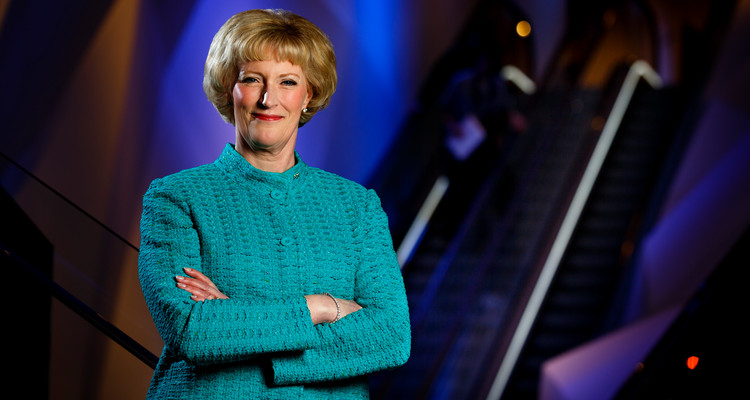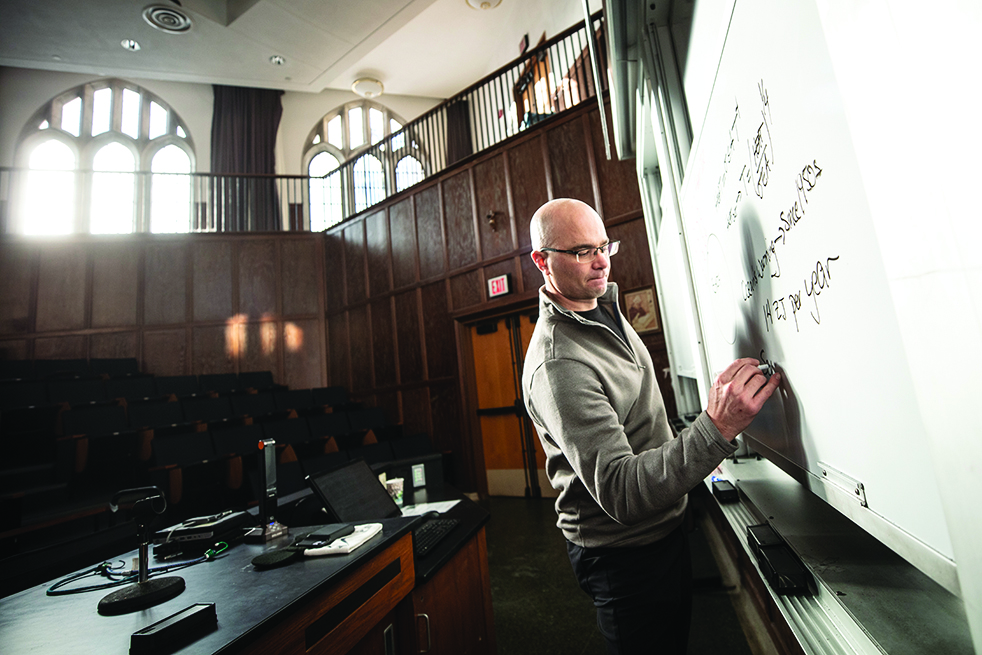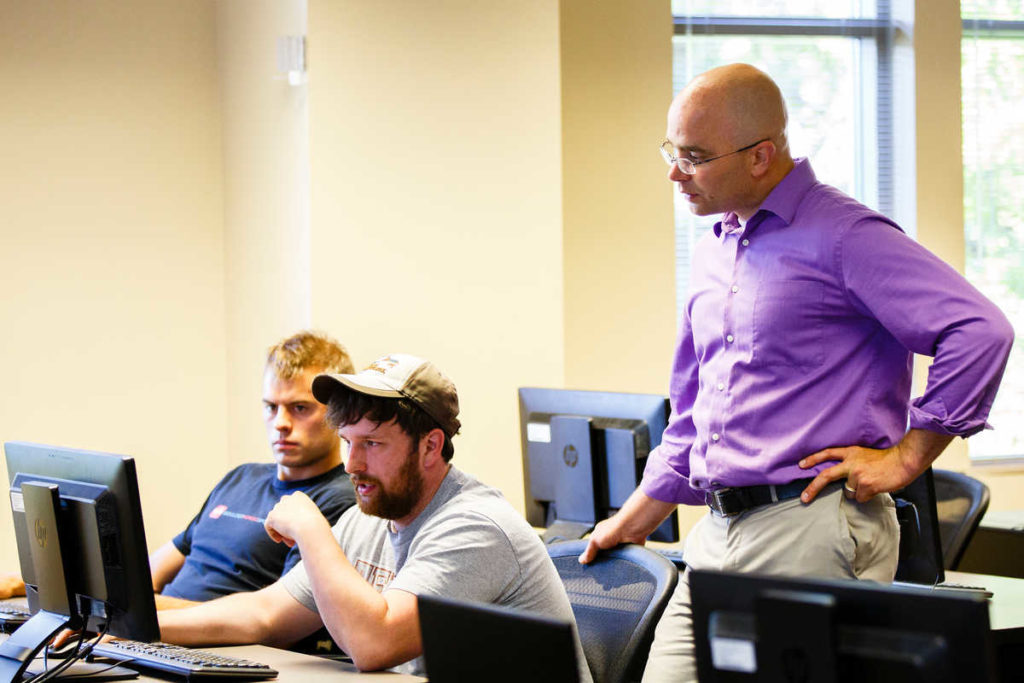According to the World Health Organization, 780 million people around the world lack access to clean water – that is more than twice the U.S. population. In addition, 3.4 million people die each year from water-related diseases. In the land of 10,000 lakes, it is hard to imagine not having access to clean water, let alone enough water. But around the world, this is a problem millions face every day.
Abdi Husen ’13 M.B.A. works to expand access to bottled water for those who previously could not afford this luxury in his home country of Ethiopia. He has taken the mission of the Opus College of Business to heart: to develop effective, principled business leaders who think globally, act ethically and create enduring value for society.
Husen has lived in Minnesota since 2000. When he felt his career growing stagnant despite owning his own business, he began to see a graduate business degree as an opportunity to gain confidence and open new doors. Motivated by his colleagues and classmates in the Executive UST MBA program, he began researching industries where he could put his entrepreneurial know-how to work. He found an answer and a new business opportunity in water. With the economy in Africa growing, filtered water has gained popularity due to issues with access to clean water. Husen knew this was his chance to go back and make a difference.
 Innovation and Entrepreneurship
Innovation and Entrepreneurship
Bottled water is something we in the United States often take for granted. Refrigerators are stocked at home and the office – the convenience far outweighing the cost. Today’s consumers appreciate the reliable, consistent quality offered by bottled water. As the leader in bottled water consumption, overall use in the United States increased by 6.2 percent in 2012, according to the Bottled Water Association and Beverage Marketing Corp.
Access to clean, safe drinking water is not a problem many encounter in the United States, but around the world it is a daily challenge. Ethiopia has a population of 85 million, and nearly 66 percent lacks access to safe drinking water, pinpointing a true need, compared to other African countries where issues related to clean water are already being addressed, according to Water.org. It goes on to say: “In rural Ethiopia, women and children walk up to six hours to collect water. Most people collect water from shallow, unprotected ponds that they share with animals. Other people collect water from shallow wells. Both of these sources are subject to contamination as rain water washes waste from surrounding areas into the source.”
And with 30 percent of the population living in poverty, bottled water is simply a luxury they cannot afford. This is something Husen is trying to change.
During his studies at the Opus College of Business, one course in particular inspired Husen, offering the strategy and concepts necessary to address this growing need in Ethiopia through innovation and enterprise – ENTR707: Innovation and Corporate Entrepreneurship. The course is designed for entrepreneurs, managers and consultants interested in creating and reinforcing entrepreneurial responses within established organizations. It examines how managers affect the nature and rate of innovation through organizational culture, structure, communication, reward and control systems.
According to Husen’s research and personal experience, “Bottled water in Ethiopia is currently overpriced because its supply lags far behind demand. For that reason, the consumer population is also limited to affluent Ethiopians.” His intention here is to “break this cycle and astronomically expand the customer base for bottled drinking water in Ethiopia.”
Husen noted the value of a disruptive business strategy in shaping his thinking about value offering: “Fulfill the unmet need of an ignored customer segment, and stay below the radar while you grow (Bower & Christensen, 1995).” More specifically, he called out three points that reinforce the value of a disruptive business strategy:
- More than 90 percent of the Ethiopian population is excluded from obtaining access to bottled water because of income status.
- Bottled water would be welcomed by Ethiopian consumers because access to clean water is an ongoing issue.
- Access to bottled water would improve Ethiopians’ health and reduce infant mortality rates.
Thinking Outside the Bottle
Husen used his classes and the guidance of Opus College of Business faculty to draft a business plan. Knowing that the cost of bottled water is primarily attributed to the cost of the bottle itself, he looked for options that would bring down the cost of production by more than 70 percent and explored alternative technologies, as well as what techniques are used by countries with similar characteristics, such as India. As a result of his research, he identified several options to help him:
-
Producing bottles from resin rather than from exported preforms has the potential to cut production costs by more than 50 percent.
-
Moving to a watered-down version of a plastic bottle, similar to a plastic bag with a strong top section and a regular bottle cap, could decrease costs drastically.
He raised $2 million through investors in the United States, Canada and Australia. From there, he was given two acres of land in Ethiopia to build a warehouse, which was completed in December 2012. Machinery for his new factory arrived in February 2013 and everything was officially up and running in mid-August 2013, with the first order being delivered to the market that same week. An opening ceremony with government officials took place in early September. Employing 40 people, Husen is single-handedly working to change the lives of those living in Ethiopia and hopes to employ many more down the road.
Throughout the development of his business plan, he spent a great deal of time and energy on the product development phase of the project. As a result, the packaging appeal of the finished product has exceeded expectations, and market trials came back with very positive results. And in an effort to get as close to the consumer as possible, Husen is partnering with neighborhood grocery stores for distribution, thus bypassing middle brokerage entities and making his product more affordable for his target market.
Current capacity is at about 50 thousand bottles a day, with a plan to double that number over the next two years. As Husen and his team ramped up for the September start date, they recently underwent plant inspection by the Ethiopian Food and Drug Control authorities, passing the inspection with no deficiencies and receiving praise for the quality of his control systems and the modern plant laboratory that is capable of analyzing raw and filtered water for mineral contents and microbial elements.
Building a Legend
Throughout the startup process, Husen has continued to turn to his UST graduate business education for inspiration and guidance. “In the Executive UST MBA program, we were taught the importance of stories and symbols in bringing about what is known as the stickiness factor or giving customers something about the product they won’t forget and can easily recite to others,” he said.
The following is printed on the product label of every bottle produced and will serve as a growing legend to connect consumers to the product: “The rain that falls over the Awash Basin of Ethiopia, after sifting through layers of sand and rocks for thousands of years, becomes a crystal clear refreshing mineral water. On the receiving end of this precious commodity is the modern mineral water treatment and bottling plant of Vita Springs. As a result, our customers, starting with you, can enjoy the taste and health benefits of a perfectly balanced clean mineral water.”
While the future of his business is still uncertain, Husen is doing exactly what the Opus College of Business and Schulze School of Entrepreneurship prepared him to do – spot opportunities and innovate in order to create enduring value for society.
Read more from B. Magazine.







